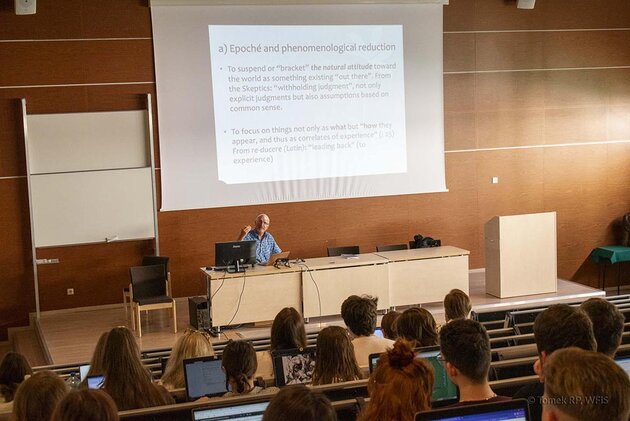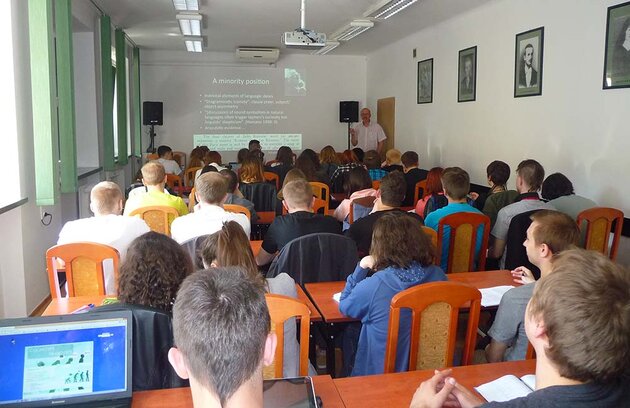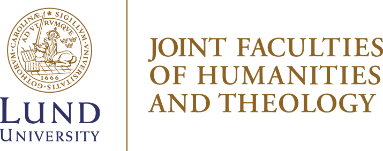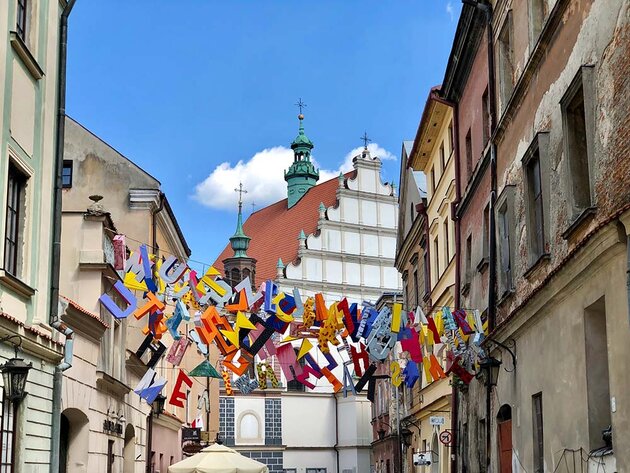Jordan Zlatev
Joint Faculties of Humanities and Theology
Jordan felt things went smoothly the first time he applied for Erasmus+ teaching staff mobility, but he was disappointed that the teaching he and his colleague did abroad could not be included in the professional development plan at home in Lund. As a result, he decided not to apply for teacher mobility funds for a couple of years. During those years, the host university was able to invite him instead.
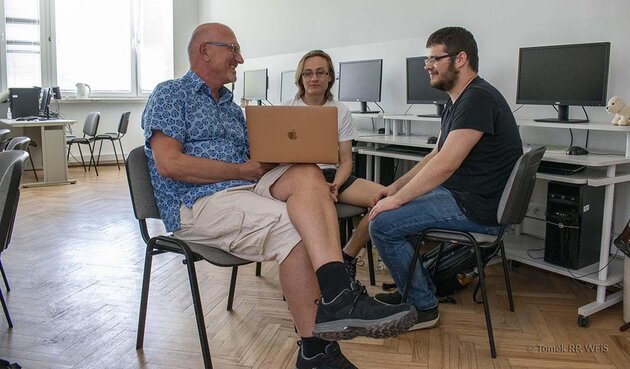
Hello Jordan. What is your department and your subject area?
I work at the Division of Linguistics and Cognitive Semiotics at the Centre for Languages and Literature (SOL). I am the head of subject for cognitive semiotics: a new subject that integrates elements of linguistics, semiotics and cognitive science, which we in Lund have helped to develop and consolidate.
You have taught abroad on several occasions. You are particularly well established at a Polish university. Tell us more about it and how the collaboration started.
Yes, it is the Maria Curie-Skłodowska University (UMCS) in Lublin, eastern Poland. I have been collaborating with them regularly since 2014. That is the same year that cognitive semiotics was established in Lund, and when we organised the first international conference on the subject.
When Associate Professor (now Professor) Piotr Konderak was particularly engaged in the collaboration, and when he became responsible for a four-year programme in cognitive science at UMCS, he established a compulsory course in cognitive semiotics within the programme. In 2015, he invited me and Professor Göran Sonesson to teach this course for the first time, and I am glad that we accepted, even if we did it outside of our normal duties. It was a very enthusiastic group of 40–45 students we met in Lublin. Piotr and several other Polish colleagues, such as Professor of English Henryk Kardela, took part in several of the lessons, and there were exciting discussions. Göran and I, and later just me, have given the course six more times since then, but never with so much enthusiasm.
You have travelled there both with Erasmus funding and with the exchange funded by the host university. How did it work when you applied for Erasmus+ teaching staff mobility?
The first time we travelled with Erasmus funding was probably in 2016, and it was quite easy to get all the paperwork ready. But I was disappointed that we could not count (some of) the teaching as part of our staffing in Lund. So I did not apply for teaching staff mobility until 2022, when SOL management allowed me to count 30 hours. The rules had changed since then though, and I found it a bit difficult to get all the paperwork together (and the stamp needed in Lublin). But the support of the Erasmus coordinators helped me to overcome my “paper phobia”, so it worked out in the end. The other times, it was the Department of Philosophy in UMCS that funded the travel and accommodation, for which I am very grateful. Considering that we do not have an equivalent course to invite colleagues from Lublin to teach (when Piotr has been to Lund on Erasmus+, it was for one or two guest lectures), and it is good to promote this model with teaching staff mobility funding.
What course components have you taught at the host university? What was the student group like and how do you think it worked?
I have taught the different incarnations of the course "Introduction to Cognitive Semiotics", as I mentioned, together with Göran the first four times, and then by myself from 2020 onwards, after Göran had retired in 2019. The course was organised as a series of lectures in the mornings, and about six group projects in the afternoon that we supervised. All this was done in one week, so the days were busy. Two to three weeks later, it was time for the presentations of the group work. The first time we came back on site to assess these; after that we did it remotely. Last year, I tried a different model: the students received their projects two weeks before the course, and they presented them after the last lecture. But there was quite a lot of variation between the groups.
You have also taught with a colleague from Lund; you travelled together on exchange. Tell us more!
Göran Sonesson and I have worked closely together since 2003 and have complemented each other well. He knew a lot more about "pure" semiotics than I did, and it was natural that he would lecture mostly on the history of semiotics, on images and on cultural encounters – while I talked about language, evolution and child development. It went smoothly for the most part, also because we sat in on each other's lectures. But this meant that, together with the supervision, there were up to eight hours of teaching per day, five days in a row. So, I got a bit tired. (Göran passed away a month ago, in April 2023, and I deeply feel his absence).
Do you see any particular differences or similarities with your teaching in Lund?
The biggest difference is the much larger student groups. Here I mostly teach Master's courses, and there are at most 15 students. The level of English and prior knowledge is generally slightly lower in Lublin, but only generally. There have always been five or six very motivated and talented students, who have often stood out and impressed more than the students in Lund. So the difference between the highest and lowest performing students was greater in Lublin. Of course, we tried to adapt the teaching to the respective levels. But it was more difficult in a larger group, and unfortunately we could see how we “lost” some students. The first few years we also assessed the students individually, and there were some who failed, and then had to supplement. But it was too much work, and we agreed with Piotr Konderak that he would do it in the future, and we would only assess the group work.
The intention was for you also to travel down and teach with one of your doctoral students, right?
In 2020 and 2021, I taught remotely because of the pandemic, and then alone. When I went back in 2022, I was able to do the whole course by myself. But I missed Göran, or another colleague from Lund to collaborate with, even though Piotr was there almost all the time. So it came to me that my doctoral student Alexandra Mouratidou, who specialises in phenomenology and consciousness in choice situations, should come along and take at least two lectures this year. Her colleagues in Lublin agreed, but for various reasons it could not be organised this year. Doctoral students have a tight schedule, with many deadlines, and it would have been too stressful for her. We will try again next year.
What do you think you have gained from these exchanges and collaborations, in terms of research, teaching and personal experience?
If we start with research, the exchange has been a prerequisite for Lublin to become one of about five centres for cognitive semiotics in the world, something that both they and we are proud of. In fact, it was Piotr Konderak and his colleagues who organised the second international conference on the subject in Lublin in 2016, before moving on to Toronto in 2018 and Aachen in 2022. Pedagogically, it was the opportunity to interact with young, enthusiastic and free-thinking people from a slightly different culture that was the most rewarding. After we completed examinations, we “celebrated” with them several times at a nearby outdoor restaurant, and they were able to open up to us even more than in the classroom, and tell us what they had gotten out of the course. This is perhaps easier to do as a guest lecturer than at home, so it has provided strong personal memories.
What has been the best part of your Erasmus periods?
Inspiration, when I felt that I was losing it in the routines at home. The personal encounters I mentioned above. Some new ideas, which I have then been able to apply and develop on the home front.
What has been the most challenging?
When I felt that a student was only there because they had been “ordered” there by their Polish professor, and was not really interested in the subject at all. Or our teaching not being sufficiently adapted to the local context. But such “culture clashes” are inevitable, and you just have to keep working, and hopefully grow from them.
You have plans to go on an exchange again soon. Please tell us what you are up to!
Yes, I am going there again in June, giving the course for the ... eighth time. My intention is to try to change it quite radically, to lecture much less and have the students present and discuss different papers in front of the whole class. My role will then be more like a supervisor throughout the course. We will see if this model works …
